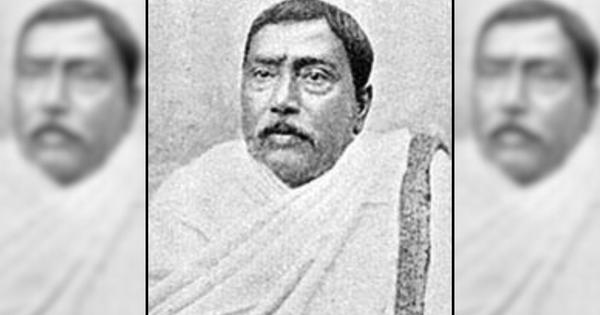
Compared to other days, we woke up quite late today. The sun had already risen, but the sky was overcast with clouds, and faint sunrays occasionally filtered through, reflecting on the rain-drenched mountains and their surroundings. It was so beautiful that I felt like comparing it to something else but couldn’t find the right words. It seemed somewhat like a smile radiating from the face of a beautiful woman whose eyes were brimming with tears. This cloudy morning was sweeter and more pleasing than the bright, radiant rays of the morning sun.
I sat on the verandah, feeling content as I admired this small town surrounded by mountains. Yet I didn’t have much time to savour its beauty, as Swamiji and the Vaidantik soon appeared, standing near me, all dressed up. Without saying a word, I went downstairs to quickly settle the shopkeeper’s dues.
Once on the road, we saw springs and streams on all sides, which made it clear that it had rained heavily during the night. At the same time, I realised that we had all slept like Kumbhakarna – unbothered and peacefully, after a long time. A little further down the road, we came across the group of Bengali pilgrims whom I had met the previous day. They were preparing to leave Nandaprayag after a year, and many people had gathered to bid them farewell. It’s natural to develop an affection for both people and nature when one stays in a place for even ten days. These five Bengali men and women had lived in this tiny hamlet for an entire year, so it was no surprise that they had formed close bonds with the people here.
I lingered in front of the shop, lost in thought, as an array of emotions swept over me. One of the three women picked up a hill girl, her clothes covered in dust, and began kissing her. The little girl looked surprised, unable to understand why she was being showered with so much affection today. For the past year, she had been cherished by these women, and now, on their last day together, they would never see her again. Another Bengali woman embraced a young hill woman and wept, her tears revealing the depth of her love and affection for the past year. This Bengali woman, who had lived in the antahpur of the fertile plains of Bengal, seemed worlds apart from the Hindustani woman of this small mountain hamlet. Yet love had forged such a strong bond between them that they cried for each other. This scene will remain etched in my memory for a very long time.
The three of us stood a little apart, while the men formed a row in front of us. Who would have thought that these simple hill folk could show us so much love and affection?
After taking leave of the hill people, the Bengalis came to bid us farewell. There was a feeling of tenderness in my heart, and I didn’t know why I felt a sort of kinship with the Bengalis in a foreign land. Probably hidden memories of the homeland were suddenly rekindled within me, and I forgot about the self and others. I only remembered that we both belonged to the same region, and so they felt like my relatives. That is why I instantly thought of my beloved birthplace. Here we were, travelling towards a desolate land of snow, and they were returning to their cherished homeland, to be amongst their friends and relatives. Who knows whether we would complete our journey and return to our usual lifestyle once again?
I remembered how I used to study in Kolkata many years ago and how I would sometimes visit Sealdah Station to see off friends travelling elsewhere. When they boarded the train and it was time for departure, a profound anxiety about returning home would fill my heart. I couldn’t concentrate on anything. After so many years, here in this mountainous region, the same feeling arose within me as I watched these Bengali men and women making their way home. I didn’t have a mother, father, wife, or children waiting for me; my house was as desolate as a forest. Yet, even so, I felt an overwhelming urge to return to the land of old memories.
I had spent so many days either starving or surviving on a few fruits, owning nothing except a blanket upon which I spent countless sleepless nights. I wasn’t filled with sorrow for my hardships, but, alas, where was the frugality of the sanyasi? Where was his strength of mind? The human heart felt too weak, too utterly useless.
With tearful eyes and a sorrowful heart, I bid farewell to the Bengali travellers whom I had known for only a day and stood watching until they disappeared from view. I don’t think my companions were affected at all, for today they began walking at a brisk pace. Only my mind was devoid of enthusiasm, and I trailed behind everyone.
After walking for six miles, we crossed a bridge and reached Lalsanga. Those who visit Kedarnath via Rudraprayag come here and join the path that leads from Badrinarayan. From Rudraprayag, we had travelled along the banks of the Alakananda. Pilgrims heading to Kedarnath cross the Alakananda at Rudraprayag and follow the bank of the Mandakini. After visiting Kedarnath, they descend over four days and take the road on the right-hand side to arrive at this point in Lalsanga.
Lalsanga had quite a few shops. The Ganga lay far below, and not everyone was eager to undertake the arduous climb up and down. On the mountain slope, there were three excellent waterfalls, and everyone managed with their waters. We stayed in a small shop in Lalsanga, and the place was far from quiet. Pilgrims from both Kedarnath and Badrikashram gathered here, creating a constant buzz of activity. There was also a large police outpost and a well-equipped dispensary in the area. I had initially planned to visit the police outpost first, followed by the dispensary, but upon arrival, we heard a story that instantly sapped any enthusiasm for venturing out. What’s more, the incident was directly related to us – us being sanyasis. I imagine readers must be eager to learn more about this tale, and while it is a shameful matter, I feel compelled to narrate it in detail.
The story concerned a swamiji who had travelled extensively to various holy places, subsisting on daal and roti. This morning, however, he had been caught as a thief. The stolen item was of little value – a worn-out pair of nagra sandals belonging to a shopkeeper. The sandals were discovered in his jhola, lying next to the holy Bhagavad Gita. The poor man had spent the night in the shop, reciting from the Gita until late into the night, and the shopkeeper had shown him great hospitality. But as misfortune would have it, the sadhu mistakenly picked up the sandals while leaving in the morning and placed them in his jhola.
Meanwhile, the shopkeeper, who had to step out early that morning, noticed his sandals were missing. Since no one but the sanyasi had been in the shop, the shopkeeper—quite understandably—did not believe the sandals had magically grown legs during the night and wandered off. The sanyasi was promptly taken to the Lalsanga police outpost. It was said that a large crowd had gathered to insult him, disgracing not just the individual but the entire sanyasi community, piling accusations upon them. Hearing this, I decided against going to the outpost myself and instead opted to hear the full account directly from the shopkeeper.
There was another reason for avoiding the outpost. I had heard that the accused sanyasi was a Purbaiya – a term used to describe people from the eastern regions of the country, including Kashi, Ayodhya, Bihar, and Bengal. If the sanyasi indeed hailed from one of these places, he would be considered one of my own brethren. Was there any reason, then, for me to share the blame associated with this individual?
As we sat in the shop, listening to the details of the theft, a small group of people – most likely Punjabis – passed by, discussing the incident. For whatever reason, one of them glanced at us and remarked, almost as an assertion, “Tamam Purbaiya aadmi chor hai” – all Purbaiyas are thieves. We had no choice but to swallow this insult in silence. Being in an unfamiliar place, and given that the remark came from strangers in the street, how could we possibly protest? It became clear to me that they, like us, were caught up in the excitement of hearsay.
We stayed in Lalsanga until the afternoon, by which time the entire community seemed consumed by discussions about the thief sanyasi. It appeared as though the locals, weary of their monotonous routines in the mountains, had found this scandal to be a welcome diversion. This sudden drama, it seemed, would serve as their entertainment and keep them animated amidst the biting cold for several days to come.
Leaving the place in the afternoon, we reached Dhaola Chati, about three miles away. By then, it was quite dark; the sky was clear, and a few stars could be seen in the distance. The red hue of the setting sun in the western sky was barely visible. All around us, we were surrounded by mountains that loomed like enormous walls. This encroaching darkness filled our hearts with a mix of fear and devotion. How many ages had these mountains been standing here? Like me, countless other travellers, disillusioned with domestic life, had probably stood here at this hour and experienced similar emotions.
We found a small space in a chati to rest but were unable to get any food that night. We lay down to sleep, but as the night wore on, our hearts began to palpitate more and more. The cold was unbearable – unlike anything we had ever faced before. How could a single blanket protect us from such biting chill? Both Swamiji and the Vaidantik covered their heads and faces with their blankets in an attempt to stay warm, but I couldn’t do the same. I had to leave my nose uncovered, or I felt I would suffocate. Yet keeping my nose exposed seemed to invite the entire icy blast straight into my lungs.
To make matters worse, the owner of the chati casually informed us that winter was beginning from that very day. If this was merely the start, what would the peak of winter feel like? My thoughts and imagination froze along with my body. We spent the entire night in great discomfort, unable to find relief. I couldn’t sleep well in the brutal cold, but Vaidantik Bhaiya’s snoring persisted unabated throughout the night.
Excerpted with permission from The Travels Of A Sadhu In The Himalayas, Jaladhar Sen, translated from the Bengali by Somdatta Mandal, Speaking Tiger Books.
This article first appeared on Scroll.in
📰 Crime Today News is proudly sponsored by DRYFRUIT & CO – A Brand by eFabby Global LLC
Design & Developed by Yes Mom Hosting






